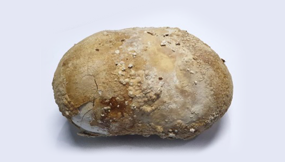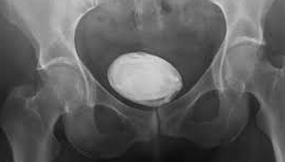
Understanding Bladder Stone (Urinary Bladder Stone)
Bladder stones, also known as vesical calculi, are solid formations that can develop in the bladder. These stones typically consist of calcium and form when minerals in your urine crystallize and accumulate. Several factors can contribute to the formation of bladder stones, including urinary tract infections, an enlarged prostate, metabolic disorders, and blockages in the urinary tract.
Bladder stones are generally removed using a procedure known as Cystolitholapaxy. A minute tube with a camera at the end called a Cystoscope is inserted through the urethra into the bladder to clearly view the stone. The doctor then uses a laser or mechanical device to fragment the stone into small pieces. The small pieces of stone are then flushed out from the bladder.
Large Bladder Stones


The underlying cause for the bladder stone is evaluated and should be treated to prevent recurrence of the problem
Causes of Bladder Stones
Bladder stones can form due to several reasons, including:
- Infections: Urinary tract infections (UTIs) are a common cause, particularly in women, but men can also be prone to bladder stones.
- Enlarged Prostate: An enlarged prostate can obstruct urination, causing incomplete bladder emptying and stone formation.
- Weak Bladder: Weak bladder walls can create pouches that trap urine, leading to crystallization.
- Nerve Damage: Conditions that affect bladder control may prevent complete emptying, resulting in stone formation.
- Kidney Stones: Small kidney stones can travel down to the bladder, leading to the formation of bladder stones.
Symptoms of Bladder Stones
Not all bladder stones cause noticeable symptoms, but when they do, you might experience:
- Blood in your urine
- Burning sensation or pain while urinating
- Frequent urination, especially at night
- Pain in the lower abdomen or, for men, in the penis and testicles
- Cloudy or dark urine
- Intermittent urination, where the flow stops and starts
Diagnosis and Tests
To diagnose bladder stones, Dr. Siddharth Jai Singh will review your symptoms and perform a physical examination. The following tests may be conducted:
- Cystoscopy: A small tube with a camera is inserted into the urethra to examine the bladder.
- Imaging: Techniques such as CT scans, X-rays, or ultrasounds can help locate and size the stones and check for any urinary blockages.
- Urine Tests: These tests assess the presence of infections or abnormal substances in your urine.
Treatment Options for Bladder Stones
If you are seeking the best bladder stone treatment in Siliguri, Dr. Siddharth Jai Singh offers various effective options, including:
- Cystolitholapaxy: The most common method where a cystoscope is used to locate and break the stone into smaller pieces using laser or ultrasound, which are then flushed out.
- Percutaneous Cystolithotomy: For larger stones, a small incision in the abdomen allows direct access to the bladder for removal.
- Open Cystolithotomy: In rare cases where the stone is particularly large or oddly shaped, open surgery may be necessary to extract the stone.
Why Choose Dr. Siddharth Jai Singh for Bladder Stone Treatment in Siliguri?
As a dedicated bladder stone doctor in Siliguri, Dr. Siddharth Jai Singh prioritizes your health and comfort. With extensive experience in diagnosing and treating bladder stones, he provides personalized care to ensure the best outcomes. Don’t let bladder stones affect your quality of life. Contact Dr. Siddharth Jai Singh today for an appointment and take the first step toward a healthier future.
Current News & Event
Free Health camp
This camp will take place this Sunday, April 14, 2024 from 9 am to 1 pm.







